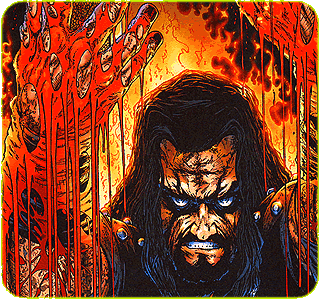
Wrestling was once the only form of pop culture more despised than comics. It was pretty much presumed dead by the time of the comics explosion of 1992. Now it's the comics publishers who are in trouble with tapped-out superheroes and shriveling markets, and the World Wrestling Federation dominates TV, politics, and the newsstand as wrestlers do commercials, appear at the Emmys, and are in demand for prime-time guest shots.
So when Chaos! Comics, licensers of the WWF's Undertaker, called early this year to offer me yet another superhero title, I turned them down but said, "If you ever do a Mankind comic, call me." I was kidding about the comic, but here I am now, writing Stone Cold Steve Austin and Mankind.
I've toiled in the superhero sweatshops for two decades, but I've also been a wrestling fan since my wife went to law school with King Kong Bundy's girlfriend. Back then, Hulk Hogan was on the wane and taking the WWF down with him -- though some talented unknowns were already weaving the more hardcore Mexican and Japanese styles into the next thing. Like comic superheroes, these wrestlers are bigger than life. But being "real," they're allowed an emotional range that -- while hardly Shakespearean -- far exceeds those of the morally hidebound superhero comics. They're a refreshing slap in the face.
Not that wrestling comics are exactly new. In Mexico, where pro-wrestling is practically a religion, wrestling comics have been huge for decades, and in the early '90s, both Marvel Comics and Valiant Comics drably mimicked wrestling TV shows with short-lived titles. But the new breed strips things down to wild personalities, drops the characters into new settings, and treats the wrestlers like action stars.
They're also giving comics fans a new taste for genres all but exterminated since the '70s by the superhero. The Undertaker inhabits a gothic hell, Nash is set in a Mad Max future, while Steve Austin roams the American southwest in a modern-day spaghetti western. Unlike the old comics, the wrestlers themselves are involved with the new ones.
Nash co-writes his comic, while the WWF superstars have veto over theirs. Not that this has been an issue for me. My only critical note from Mankind (who threw a ghost-writer off his soon-to-be-released biography and wrote it himself by hand during nights on the road) was a bearhug -- a bonus from the man who kept me interested in wrestling at times when nothing else did. That's the secret of writing wrestling comics: stick to the characters. And when the character is Mankind, that's an easy proposition.
Mankind (played by Mick Foley) pioneered the rougher and more realistic wrestling style popular today. In one match, his ear was accidentally torn off. In another, a 20-foot plunge from a steel cage drove teeth out through his nose. The way I write him, Mankind waffles in a blink between cuddly (if grotesque) naïf and homicidal maniac, humorously brutal and brutally humorous. The sort of hero writers dream about.
Okay, so it isn't high art, but what is these days? Art Spiegelman can have the high ground, but something's got to get bodies back buying comics again, and wrestling comics seem to be it. More are on the way. Even Marvel Comics is leaping on the bandwagon, with plans to flood WCW titles onto the market early next year.
Riding pro wrestling's rising tide, wrestling comics point a way out for a decrepit industry choking on its own intransigence. The question is whether they've learned from the past, or if they're doomed to repeat it.
Steven Grant is kept alive by bestial acts.
